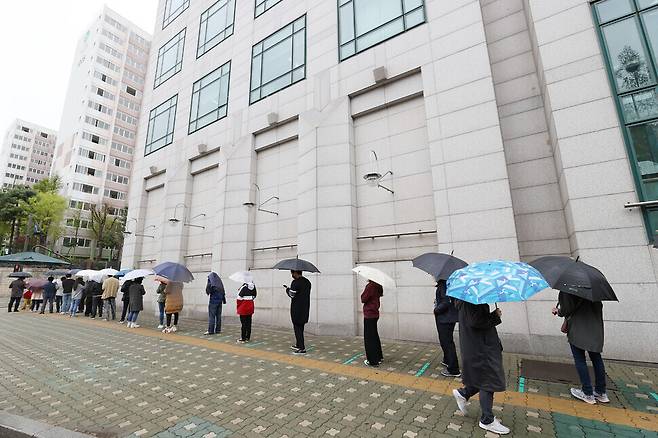\"K-Quarantine\" at crossroads as fourth wave looms
전체 맥락을 이해하기 위해서는 본문 보기를 권장합니다.
He went on to issue calls to "expand testing targets as much as possible and be more proactive about preemptive testing."
Moon said the same day, "Domestic production of the Novavax vaccine will begin this month, and we have secured the necessary raw materials for vaccine production during the first half of this year."
이 글자크기로 변경됩니다.
(예시) 가장 빠른 뉴스가 있고 다양한 정보, 쌍방향 소통이 숨쉬는 다음뉴스를 만나보세요. 다음뉴스는 국내외 주요이슈와 실시간 속보, 문화생활 및 다양한 분야의 뉴스를 입체적으로 전달하고 있습니다.

South Korean President Moon Jae-in sounded a warning over a building fourth wave of COVID-19 infections as the daily confirmed caseload topped 600 for a sixth straight day Monday.
Experts have taken aim at the South Korean government for what they see as its "inadequate" measures. In particular, they noted the government has merely intensified its warnings to the public while dragging its feet about raising social distancing levels, adding that its efforts to introduce vaccines quickly have proven limited.
Previously rated as a success for the 15 months since South Korea's first COVID-19 patient was diagnosed on Jan. 20, 2020, the South Korean disease prevention model now finds itself at a major crossroads amid frictions with small business operators and other businesses and difficulties acquiring and administering vaccines.
Commenting on the recent resurgence of the virus while presiding over a special disease prevention review meeting Monday at the Blue House, Moon noted the "precarious situation, where things could explode into a massive wave if we aren't careful."
He went on to issue calls to "expand testing targets as much as possible and be more proactive about preemptive testing."
The new daily total of confirmed COVID-19 cases Sunday stood at 587 as of the end of the day. While the number fell below 600, the decrease reflected the lower testing numbers on weekends.
The average new daily caseload for the week from Tuesday to Monday totaled 606.6, with a trend of increasing numbers throughout South Korea.
"If we fall behind here, we are going to have no choice but to raise the social distancing level, even if that places a burden on livelihoods and the economy," Moon said Monday. His remarks indicated that for now, the government plans to leave in place the decision Friday to extend social distancing levels of 2 for greater Seoul and 1.5 for the rest of South Korea for another three weeks.
The same morning, Kang Do-tae, first general coordinator for the Central Disaster and Safety Countermeasure Headquarters, said that the situation was "the kind of crisis where even raising the [distancing] level right now might not be enough." But he did not share any additional measures to prevent the fourth wave from escalating.
Critics previously accused the government of allowing the scale of the third wave to grow by waiting too long before raising the distancing level back when infections began rising in late November and early December of last year.
Given the incubation period of the COVID-19 virus, one to two weeks pass before intensified prevention measures translate into a decline in the caseload. For this reason, experts have advised that the level of response needs to be adjusted rapidly to nip rises in the bud early on.
"The failure to intensify our prevention measures even after the fourth wave began last week means a greater possibility that daily caseloads in the 1,000- to 1,500-patient range are going to become a reality," said Eom Joong-sik, a professor of infectious disease at Gachon University Gil Medical Center.
"Our vaccination rate to date is not enough for us to weather a wave with relaxed disease prevention measures," he added.
Moon said the same day, "Domestic production of the Novavax vaccine will begin this month, and we have secured the necessary raw materials for vaccine production during the first half of this year."
"The finished [vaccine] will be available by June, and 20 million doses [enough for 10 million people] are scheduled to be supplied to the South Korean public through the third quarter," he added.
He also said that the "controversy over the safety of the AstraZeneca vaccine has been put to rest" — another remark that had observers calling his assessment of the situation "unrealistic."
Another issue to be addressed involves coordinating with local governments seeking to go in a different disease control direction from the uniform measures imposed by the central government.
In an online briefing Monday, newly elected Seoul Mayor Oh Se-hoon announced plans to "develop customized disease prevention guidelines for different industries and business types to take the place of existing disease prevention guidelines." However, he also indicated his willingness to discuss the matter with the central government.
By Choi Ha-yan, staff writer
Please direct comments or questions to [english@hani.co.kr]
Copyright © 한겨레. 무단전재 및 재배포 금지.
- 서울형 상생 방역?…경기·인천 ‘오세훈표 민폐 방역’ 비판
- “일 후쿠시마 방사능 오염수 방류는 ‘핵 테러’…철회하라”
- ‘이재명 눈도장’ 차례로…경기도청 찾은 민주당 대표 후보들
- 4월에 한파주의보…내일 아침 오늘보다 10도 ‘뚝’
- ‘소통’ 강조한 김남국, 지지자들에게 ‘반문 커뮤니티’ 가입 권유…“좌표찍기냐”
- ‘1㎏ 6300원’ 비싼 대파, 5월부터 싸진대요
- 미 경찰 “테이저건 쏘려다 ‘총격’ 사망”…잇단 흑인 희생에 시위 ‘격렬’
- 장르물, 여성 드라마 피디가 주름잡다
- 후쿠시마 오염수 정보공개 안한 일본…“국내 영향 분석 불가”
- [김양희의 맛있는 야구] 프로야구 인기, 경고등이 들어오다